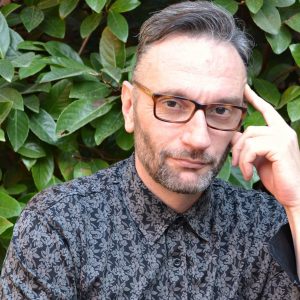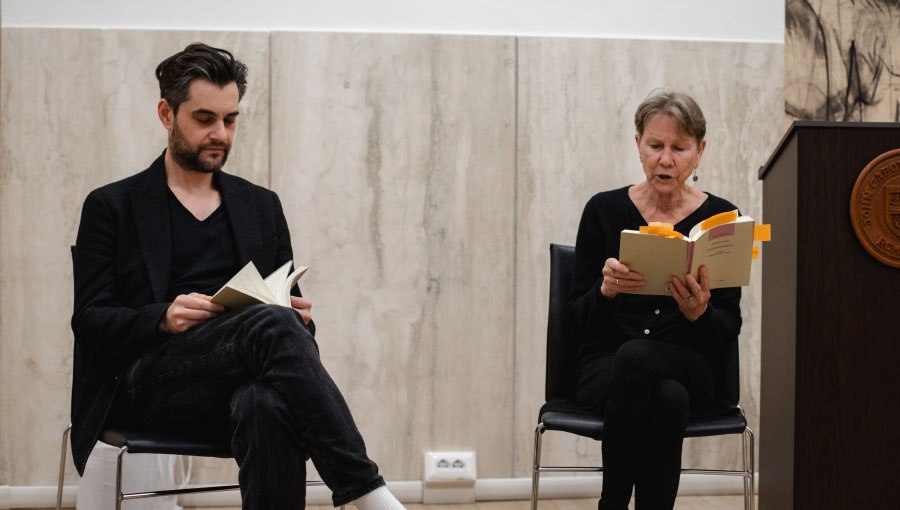Donkey See, Donkey Do and Extravagant Stranger: New Books by Professor Connelly
Born in Essex, south-east England, Professor Daniel Roy Connelly has spent much of his adult life being educated in Italy, India, Bangladesh, the USA, Scotland, and China. Formerly a British diplomat, he has been an academic since 1999. He holds a B.A. from Columbia University, and an M.Litt. and Ph.D. from the University of St Andrews. He is also a published poet and playwright for which he has won several international prizes. He has directed theater on three continents.

Dr. Daniel Roy Connelly
Two of your books, Donkey See, Donkey Do and Extravagant Stranger will be published soon. Can you tell us something about them?
Certainly. They are not complicated. Donkey See, Donkey Do is a political allegory about an alien donkey who crashes to earth in a pod from the condemned planet Ur-awe, and who, after steadily ascending the ranks of British class, becomes prime minister. Obviously. The serendipity of the UK general election on June 8 and Donkey’s launch at The Windmill in Brixton, London, on June 11, is delicious.
Extravagant Stranger is a memoir as written in 75 blocks of poetic text, mostly under 300 words, which is launching in Bloomsbury on July 6. It begins narrated by the sperm that partly made me and concludes with me looking over my dead body, as laid out in a 1999 Ozwald Boateng three-piece purple crushed velvet suit. What lies between is my absurd take on the world for the last 50 years; three continents and lots of scalliwagging.
Are there any other projects you are working on you would like to share? What are your future projects?
I’ve written 2.5k poems in the last 4 years so I’m always tinkering. I never have to confront the blank page. I have another collection ready to go and three further pamphlets, totally unlike my previous works, yet still fully aware that the world is a completely barmy place to live in. I’ve just contributed to an anti-gun anthology which is now published in the USA and am also currently working on an online collection with brilliant British conceptual poet Aaron Kent. You can find our collaboration here: Poetic Interviews. I am also involved in men’s mental health projects such as The Good Man Project, and have been contributing to Princes William and Harry’s “Heads Together” project for male depression and PTSD.
What is your teaching philosophy?
Get a room full of students who want to be there instead of having to be there. I always make a fool of myself first. Everyone relaxes. Humor is welcome with open arms as is humility. I ask students to stand briefly and use their five senses simultaneously. This helps them forget where they have just come from or where they are going. They enter the present, by far the best way to learn.
During our first meeting, I often have students do a brief acting exercise, for example, speak about themselves in the 2nd or 3rd person. This does wonders at removing ego.
No matter what class I’m teaching, what I want to foster is a sense of support among peers. There’s no such thing as a stupid question, only an ill-considered response. Just because I’m the guy up front with the Ph.D. doesn’t mean I haven’t been through what some students might be going through.
What is the advantage of studying literature in this day and age?
In this time of our time, when life is a numbers game shackled to the markets, our first recourse after major political action is the world’s Stock Exchanges. This basically tells us whether rich people are likely to be happy or sad on any given day. This is man-made and tragic – the tragedy of greed – when babies are being blown to shreds in Syrian hospitals because people cannot commune beyond share prices. More than ever, the world needs the written and the spoken word to tell its stories, to communicate its confusions, and ameliorate its anger. There are states in India with 99% literacy rates but only 1% of the people can afford stock market shares. On a human level, literature attacks these inequalities. Most people can’t afford stocks. Let’s give them word-bombs to ignite instead.
Prose vs Poetry. The eternal struggle. Do you have an aesthetic preference for one of the two and why?
Actually, my eternal struggle is poetry or stage-plays but it all ends up in a mess. I write in blocks of poetic text which shift a gear up and down and head towards epiphanic conclusions. In part, they contain raw speech and are through in 2 minutes. Aesthetically, I currently prefer to document my time this way; nuggets. As for stage plays, I can get in and out of a whole world in 2 – 3 hours. And the stage is the training ground for dialogue, which informs the speech I write in poetry. It is a devil to get right – I sweat on and attempt to parade its virtues, night after night.
Which are the five books/authors that every person should read in their lifetime and why?
Let’s go for the big religious texts; they are the key to peace. So, the Bible, the Torah, the Upanishads, the Koran and the Lotus Sutra. Take the cream of those and there’s your utopia. (Can I squeeze in the screenplay to Monty Python’s Life of Brian which will make you laugh anytime, anyplace, anywhere, even if laughter is your sworn enemy?)
In recent years there’s been an increasing pressure on students to pick whichever major has the highest employment rate (normally in STEM/Business fields). What does this mean for the humanities going forward? Is this change in perspective a result of the financial crisis or a shift in how liberal arts are perceived?
There is a vast crossover between the liberal arts and STEM subjects. I think it is worth asking what are we employing STEM workers to do, make the world a better place? Let us hope so. How will they manage outside the facts and stats breeding ground? Do they have a chance without having read a novel, or synthesized a complicated ethical argument, or seen how strangers overcome disaster? Probably not. The Liberal Arts are a field of dreams, and if we are to remain human then the word human must be assured its place in the humanities. Without wishing to tread on transhumanist toes: people, yes, machines, no.
What is your advice for a student who wants to pursue an English major?
If you want to make a difference in the world, comprehend global sincerity, rapprochement, powerful exchanges of philosophical ideas with people who do not exist, and learn to write to impress these ideas hard and memorably on the world around you, pursue English Literature. Communication is humanity’s greatest strength. If you cannot stand how the world functions, pursue English Literature, because the works you will read are produced by writers similarly dissatisfied with it . Learn the workings of articulate dissent. Shelley declared poets to be “the unacknowledged legislators of the world.” Now, the markets are. Study English to help the planet redress this egregious imbalance.
What is the secret to an outstanding theatrical performance? What advice would you give to an aspiring actor?
To remain constantly in the present with humility, sincerity, gratitude, and empathy. Don’t think you know it all because you never will. A play is only as good as its worst actor. If you like staring in the mirror at home at lot, acting might not be for you. If you like showing off in front of your friends, acting might not be for you. If you want to make it big in Hollywood, counseling might be best for you. Stage acting is about what you find of yourself in your character. Don’t do it for the money, the bling, the lights, the love. Do it because you still want more of it, despite being torn to shreds night after night.
How do you explain Shakespeare’s success especially if compared to popular non English playwrights like Ibsen, Chekhov, Euripides, Moliere, Schiller, etc.)
Robert Graves marvelously said, “the remarkable thing about Shakespeare is that he really is very good, in spite of all the people who say he is very good.” Aside from the self-backslap, Graves was referring to Shakespeare’s powers of storytelling at a time of unprecedented high fever for the stage, which, despite centuries of scholarship, we can barely understand, let alone marvel at. In Brutus and Hamlet, Shakespeare invented Human Psychology. How about that?
Sure, the playwrights above – 5th Century BCE to the 20th century – had rivals; but not as in the late-16th century, when stagecraft, acting, vast textual output, and England’s view of itself in the world and the language that gave it dominance was changing the face of theater forever. Pretty impressive.
Oh, and no Shakespeare, no Tarantino. Shakespeare and Tarantino adore violence, the more preposterously gory, the better. What if Tarantino were to direct Macbeth, for example? There is a scene in Reservoir Dogs wherein Tim Roth plays out a soliloquy befitting of Shakespeare on a rooftop. But chiefly, it is the absurdity of people, men really, when confronted with violence, that to me makes Tarantino a true Shakespearean.
Please tell us about a challenge you encountered in your teaching career. How were you able to overcome it?
I directed the world student premiere of a Seamus Heaney play at the Edinburgh Fringe in 2007 with hardly any money or resources. In the end, the play made a profit and won a Fringe award.





